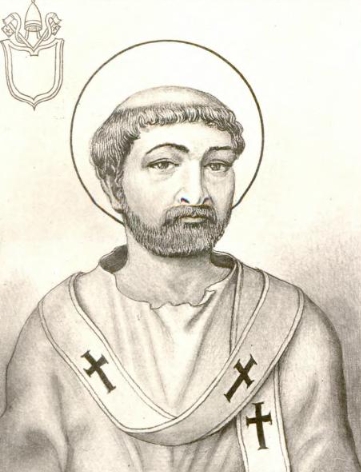The Lives and Times of the Popes - Saint Lucius I – A.D. 252
 It is probable that Saint Lucius I, a Roman priest, one of the companions in exile of Saint Cornelius, was elected at Civita Vecchia. He received the pontificate A.D. 252. He ordered that the ministers of the altars should never be chosen except from among men of the purest virtue, and that none of them should ever go unaccompanied into a house occupied by a woman, and that no priest should reside with a woman unless she should be of his nearest kindred. The penalty of the priest for breach of that regulation was deposition; for the woman, exclusion from the Church.
It is probable that Saint Lucius I, a Roman priest, one of the companions in exile of Saint Cornelius, was elected at Civita Vecchia. He received the pontificate A.D. 252. He ordered that the ministers of the altars should never be chosen except from among men of the purest virtue, and that none of them should ever go unaccompanied into a house occupied by a woman, and that no priest should reside with a woman unless she should be of his nearest kindred. The penalty of the priest for breach of that regulation was deposition; for the woman, exclusion from the Church.
Lucius, who, like Saint Evaristus, was anxious for the greatness and dignity of the pontificate and the episcopacy, ordered that two priests and three deacons should constantly accompany the pontiff and the bishops as witnesses of their whole course of life. At the commencement of his pontificate, Lucius was sent into exile, but was soon afterwards recalled. This recall was caused, not by repentance, but merely by a caprice of cruelty, as the Eternal City was soon convinced. We are informed of this return by a letter of Saint Cyprian congratulating him. Lucius received that letter with a transport of joy. The motive of the congratulation was worthy of both saints. The African doubted not that God had granted the termination of an exile in an obscure place to bring back upon a more brilliant theatre one who was destined to perish before the people of Rome. Felicitations of this kind are to be found only in the epistles of Christians.
Saint Lucius received the crown of martyrdom on the 5th March, A.D. 253.
In two ordinations this pope created seven bishops, four priests, and four deacons. He governed the Church a little more than five months. He was interred in the cemetery of Saint Calixtus.
- from "The Lives and Times of the Popes", by Alexis-François Artaud de Montor
 It is probable that Saint Lucius I, a Roman priest, one of the companions in exile of Saint Cornelius, was elected at Civita Vecchia. He received the pontificate A.D. 252. He ordered that the ministers of the altars should never be chosen except from among men of the purest virtue, and that none of them should ever go unaccompanied into a house occupied by a woman, and that no priest should reside with a woman unless she should be of his nearest kindred. The penalty of the priest for breach of that regulation was deposition; for the woman, exclusion from the Church.
It is probable that Saint Lucius I, a Roman priest, one of the companions in exile of Saint Cornelius, was elected at Civita Vecchia. He received the pontificate A.D. 252. He ordered that the ministers of the altars should never be chosen except from among men of the purest virtue, and that none of them should ever go unaccompanied into a house occupied by a woman, and that no priest should reside with a woman unless she should be of his nearest kindred. The penalty of the priest for breach of that regulation was deposition; for the woman, exclusion from the Church.